|
|
|
Liz Irving - Part ONE
"Simply the best coach in the world" - Nicol David |
|
There are people you instantly
dislike. And some you feel like family from the first time you meet.
Guess which category Liz belongs to in my eyes... Bingo.
So I decided to learn a bit more about Nicol David's coach, and
right after the European Teams in Amsterdam, I spent two days with Liz
and her team to try to get to know them better.
And after talking long hours with the former world number two, I know my
first impression was the correct one. Immensely caring, highly
knowledgeable, patient, never overbearing yet assertive, she has all
the qualities of the perfect coach.
And the setup she has organised in Amsterdam is truly remarkable. I
felt comfortable from the first second I arrived, and I think I'll
go and spend a few days there myself soon. SquashCity is like, well,
a true family...
An article in four parts: first, Liz talks about her career, and
setting up her base in Amsterdam; then in the second part of the
article she speaks about Nicol and the work they've been doing
together, and Nicol speaks about Liz and explains what "the
best coach in the world" brought to her life ... |
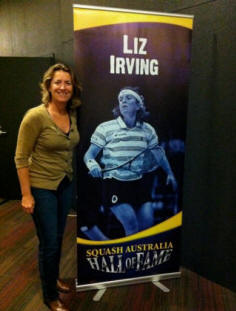
|
|
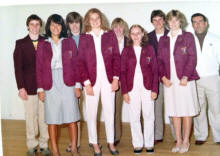
"All went on to be Former world no
2s
Danielle Drady (2nd left) Rodney Martin, Chris Robertson
and me. Pretty strong junior players as a group. The rest
could have also possibly gone on to the same level but never pursued
a pro career!"

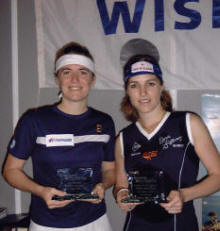 |
JUNIORS DAY, NOT EXACTLY FIT, WAS
I...
"I have a little confession to make. I
worked harder on fitness later in my career. I was Australian Junior
Champion U15, 17, and 19, itís so long back I canít remember! I was
seeded number one for the World Juniors in 1983, and basically,
I didnít really train for squash However I played a lot of
tournaments around Queensland, and in other parts of AustraliaÖ
A lot of top coaches Iím sure are frustrated with how sometimes, it
can be a bit unbalanced between " knowing how to play squash" and
"fitness at all costs"...
Thatís our job - to try and make sure that the player
gets the right balance. If itís not enough of one thing, or too much
of another, thatís not good enough. To oversee well, to identify the
strong points, the weak points, and how to work forward and improve
on that.
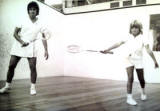
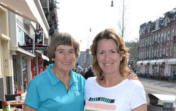
I loved squash, I did some squash camps here and there, never had
much coaching to be honest, even though my mum was a top player, she
used to play me, but she didnít really coach me. Mum was a former
World No. 2 in the late 60's and early 70's. She was internationally
No.2 to Heather Mckay and a former British Open finalist in 1971. So I just watched the
top players, I had them around all the time, so I guess I learned a
lot through osmosis.
 Thatís how I developed my squash, and when I lost in the world
junior semi-finals, 10/8 in the 5th, to Robin Friday-Landborn, and I
hadnít lost to her all year, I realised that if I really wanted to
take this serious, I had to pick up the game and get fit for my
squash. Thatís how I developed my squash, and when I lost in the world
junior semi-finals, 10/8 in the 5th, to Robin Friday-Landborn, and I
hadnít lost to her all year, I realised that if I really wanted to
take this serious, I had to pick up the game and get fit for my
squash.
I was 18, ranked five or six in Australia for the women, and I wanted to be
pro. So I trained for three months with Aub Amos, then I went overseas.
I still wasnít fit, compared to the real terms of that, but then I
gave myself three years to really learn the game at the top end, and
get in amongst them .
get in the amongst of all.
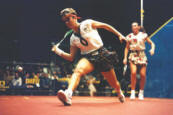 So my vision was to learn how to play top squash. That was my
priority, and in the process you train, you work hard, but my
priority was to play tournaments, get amongst all the top players,
and learn, and learn, and learn. So my vision was to learn how to play top squash. That was my
priority, and in the process you train, you work hard, but my
priority was to play tournaments, get amongst all the top players,
and learn, and learn, and learn.
And within three years, I was five in
the world, and the players I used to lose to in the beginning, I was
beating comfortably. I was now 21 and I made my first British Open
final at having just turned 23. |
|
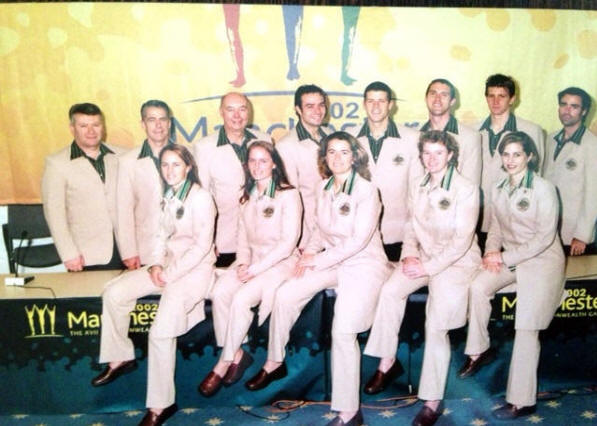 |
NO PAIN, NO GAIN...
My fitness regime went up and down. It was different in those days.
The attitude was
ďno pain no gainĒ, and we all over trained all the time. I
mean I was fit for squash, but half the time I would get to a
tournament and I wasnít firing, I was tired, because I had done too
much, too much at the wrong time. It wasnít about sport science ,
it was a bit of the ďold schoolĒ methods. So a lot of trial and
error was going on all the time.
SUSAN DEVOY COACH, VINCE POWEL...
"So I floated along, I was a top player, then when Susan Devoy
retired, she said to me that her trainer would like to work with me,
when she won her last worlds, and I started to work with him, Vince
Powell. He was the first one who taught me about rest and
recovery, and also periodising my training program.
Sometimes I remember asking him ďare you sure Iím doing enough,Ē
because I was so used to, well, doing too much Ė which becomes non
productive in the end.
Actually I became the fittest Iíd ever been working with his
methods, so I went back up to number two in the world.
I became pretty solid in that position, I came back and won the
Leeks Classic - that was the Leeks Classic in Cardiff that became
the British Open in 94/95. At the time, it had been the first time I dropped
below five, I dropped down to nine, because I had a couple of injury
problems, but I started work with Vince in Ď92, came back from
recovery, beat everyone and won the tournament.
DOING TOO MUCH...
I trained at the Australian Institute of Sport in the beginning
of 1986
( I think ) for about one year.Ö We trained, I did a lot of work,
but I think I was doing too much. I was doing a session when I
was 21, I remember, before I hopped on the plane to England, I just
did my last session of 400 hundreds, I did 25 sets with a 60 second
rest, that was my last session that morning, and then I got on the
flight that afternoon to England for the European season. I mean, 25
sets???? And thatís what we did.
I worked with really good people, but Vince was the one who really
taught me about ďless is moreĒ. |

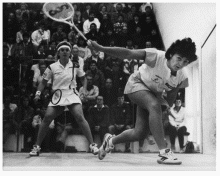
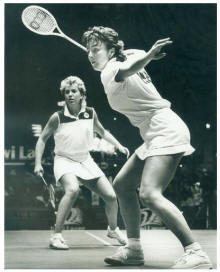
|
|
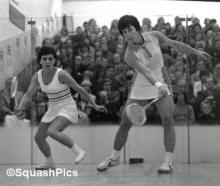
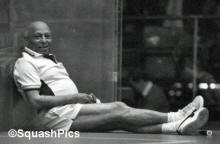
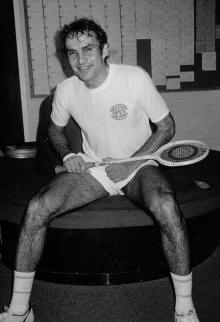
Photo : Fritz Borchert
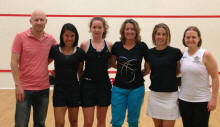 |
LEARNING ABOUT TACTICS...
Keith Walker, he was a
professional in the 50s and 60s. He wasnít an amateur player, he was
a very good player, a great coach. He was also in the tennis world,
involved in Golf as well. He was just a very good all around coach.
He worked with a lot of the Australian Greats including Heather Mckay
and Ken Hisco.
Keith used to travel with Hashim Khan Ė I think he organised
the Tour of Australia with Hashim, and they became very close
friends. Basically, all Keithís methods were learned through Hashim,
so he very much learned the Pakistani subtleties in the racquet work
and tactical side of squash.
Keith was the first one that really taught me about understanding
the tactical side of squash in a very clear and simple way. So he
started to work with me, three four times a year, I would go to
Sidney for a couple of weeks, and he would take me through all the
stuff and he made a tremendous difference to my squash, to my
understanding of the game.
EGYPTIAN INFLUENCE
The other major influence on my squash came from Egypt -
Ahmed
Safwat, the gentleman of squash, went to number four in the world,
and died of a heart attack at 50. He was actually very influential
with the Egyptian girls at the time.
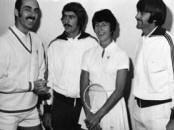 I worked with Geoff Hunt, I worked very closely with
Heather McKay, she was tremendous to work with, Vicky
Cardwell, she really helped me a lot with my squash, Mike
Johnson, from Reading who used to coach all of us, Rodney,
Sarah, Daniel... I worked with Geoff Hunt, I worked very closely with
Heather McKay, she was tremendous to work with, Vicky
Cardwell, she really helped me a lot with my squash, Mike
Johnson, from Reading who used to coach all of us, Rodney,
Sarah, Daniel...
I worked with really wonderful coaches.
GIRLS ONLY...
The reason why I prefer to work with female development is that
because thatís where I feel my strength lies. Of course I can work
with male development too, but I just feel that my knowledge comes
from the womenís game. I know and understand what it takes, what is
required to get there, and thatís something you canít learn in paper
book, youíve got to experience that.
I like helping the transition from junior to senior. Thatís
where I really feel I can help girls. We lose so many girls from the
age of 17 because the next step is actually the hardest step. Junior
squash is junior squash. Thatís your learning years, learning how to
compete but at the end of the day, itís not that important, is it.
That next step I feel is the most difficult.
Thatís the part I like, to try and help them in those steps because
they are the toughest ones to get through.
|
 |
|
STARTING TO COACH...
Youíve got to realise that ten years ago there were no women
developing any programs, it was all male coaches, no women coaches
available anywhere. Not to mention, no trust in women coaches. I
certainly wasnít encouraged to coach! I had to make that happen
myself, I had no help to develop that at all. Amazing! I was the
first one to set up a program.
Iím a much better coach now than I was ten years ago, because Iím
becoming more of a coach. I was always a player, coming from a real
player perspective, which I still do. But Iíve made a transition to
become more of a coach, basically.
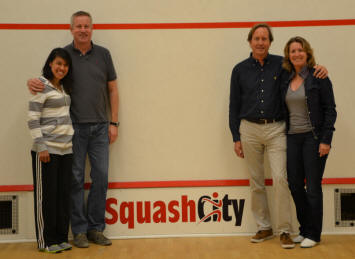
WHY AMSTERDAM
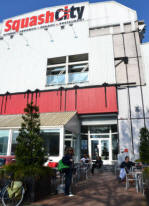 Because when I first came here in March 1999, the Australian
who was coaching here in SquashCity was leaving, and offered me
the chance to
replace him. Yes, Iíve been here all that time! Because when I first came here in March 1999, the Australian
who was coaching here in SquashCity was leaving, and offered me
the chance to
replace him. Yes, Iíve been here all that time!
I would have never
thought I would still be here, but I love the club. If I went and
coached somewhere else, I probably wouldnít be that happy, to be
honest.
I need a social environment, I donít want to be squash
squash squash, a lot of people Iíve got to know here are not squash
players, different people from different professions, and thatís
nice.
Back to the beginning, he said the job is yours, have a think about
it, I wonít offer to anyone else until I hear from you. He was spot
on. He thought I would be perfect for the club, he had the right
feeling for my personality type to work here. So I took the job and
I thought, oh, Iíll come here for a year, that will be fun, and I'll
sort of decide what I want to do after that.
END OF THE PROFESSIONAL ROAD...
Well, I had some injuries, and they were not getting right, so, I
just thought I can either stay at home in Brisbane and feel
miserable, because I canít train - I had lower back problems, so you
canít train, and you canít be at the level you need to be to
compete. Or I could come here and coach for a year, have a bit of a
break.
Actually, my injuries got a lot better as a result of not pushing
myself, then after a year I thought I quite enjoyed it, I donít need
to rush home just yet, Iíll stay another year, and then in the
meantime, Vanessa Atkinson asked me if I would coach her.
At the time, she was 22, 23 in the world, not going anywhere really
with her squash, sort of fluffing around. So I worked with her and I
said to her when that happened, do you remember what I said to you
three years ago, I said to you you would be top five within three
years. And she was top five in the world within three years,
literally to the month.
And when I told her that in the beginning, the look on her face, she
literally couldnít think that far ahead. So that was an interesting
experience, we worked together for about four years.
Nicol came along in 2001. In she came wanting information,
wanting to learn, and that sort of took off! So I thought it looks
Iím going to be here for a little while, and I took my coaching a
bit more seriously, and developed my academy more.....
in PART 2 - MEET THE
TEAM... |
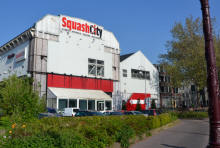
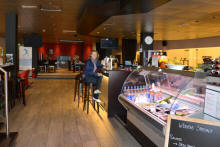
In SquashCity
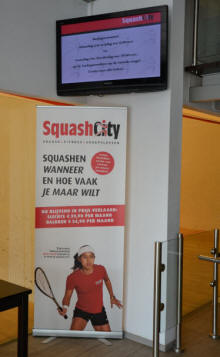
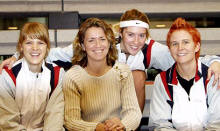
©2004 Martin Bronstein
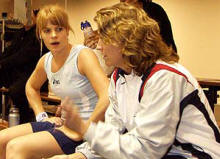
©2004 Martin Bronstein
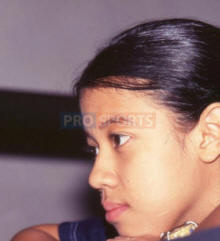 |
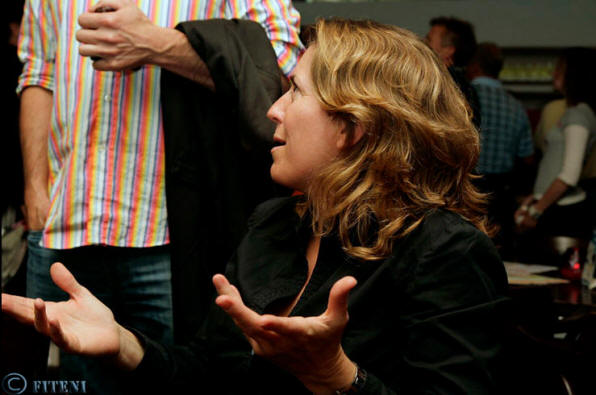 |
|